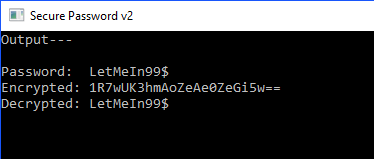I wrote this in C# to encrypt and decrypt a password, which could be stored in a file, or perhaps the registry. It converts the password into a byte string, that byte string is converted using base64, and then is encrypted using AES. Take note, I have added permutations for the byte streams. These should be changed for every password you encrypt. One final thought, the overall security of this process depends on the protection of your C# code. So…compile this, and keep any source code in a secure location. This is not meant to be used as a secure app for distribution, just as a method to generate the encrypted password. If you’re trying to create a standalone app, look into AppendChar.
Screenshot

Code
using System;
using System.IO;
using System.Security.Cryptography;
using System.Text;
namespace SecurePassword
{
class Encode_Decode
{
public static class Global
{
// set password
public const string strPassword = "LetMeIn99$";
// set permutations
public const String strPermutation = "ouiveyxaqtd";
public const Int32 bytePermutation1 = 0x19;
public const Int32 bytePermutation2 = 0x59;
public const Int32 bytePermutation3 = 0x17;
public const Int32 bytePermutation4 = 0x41;
}
// The console window
public static void Main(String[] args)
{
Console.Title = "Secure Password v2";
Console.WriteLine("Output---");
Console.WriteLine("");
Console.WriteLine("Password: " + Global.strPassword);
string strEncrypted = (Encrypt(Global.strPassword));
Console.WriteLine("Encrypted: " + strEncrypted);
string strDecrypted = (Decrypt(strEncrypted));
Console.WriteLine("Decrypted: " + strDecrypted);
Console.ReadKey();
}
// encoding
public static string Encrypt(string strData)
{
return Convert.ToBase64String(Encrypt(Encoding.UTF8.GetBytes(strData)));
// reference https://msdn.microsoft.com/en-us/library/ds4kkd55(v=vs.110).aspx
}
// decoding
public static string Decrypt(string strData)
{
return Encoding.UTF8.GetString(Decrypt(Convert.FromBase64String(strData)));
// reference https://msdn.microsoft.com/en-us/library/system.convert.frombase64string(v=vs.110).aspx
}
// encrypt
public static byte[] Encrypt(byte[] strData)
{
PasswordDeriveBytes passbytes =
new PasswordDeriveBytes(Global.strPermutation,
new byte[] { Global.bytePermutation1,
Global.bytePermutation2,
Global.bytePermutation3,
Global.bytePermutation4
});
MemoryStream memstream = new MemoryStream();
Aes aes = new AesManaged();
aes.Key = passbytes.GetBytes(aes.KeySize/8);
aes.IV = passbytes.GetBytes(aes.BlockSize/8);
CryptoStream cryptostream = new CryptoStream(memstream,
aes.CreateEncryptor(), CryptoStreamMode.Write);
cryptostream.Write(strData, 0, strData.Length);
cryptostream.Close();
return memstream.ToArray();
}
// decrypt
public static byte[] Decrypt(byte[] strData)
{
PasswordDeriveBytes passbytes =
new PasswordDeriveBytes(Global.strPermutation,
new byte[] { Global.bytePermutation1,
Global.bytePermutation2,
Global.bytePermutation3,
Global.bytePermutation4
});
MemoryStream memstream = new MemoryStream();
Aes aes = new AesManaged();
aes.Key = passbytes.GetBytes(aes.KeySize/8);
aes.IV = passbytes.GetBytes(aes.BlockSize/8);
CryptoStream cryptostream = new CryptoStream(memstream,
aes.CreateDecryptor(), CryptoStreamMode.Write);
cryptostream.Write(strData, 0, strData.Length);
cryptostream.Close();
return memstream.ToArray();
}
// reference
// https://msdn.microsoft.com/en-us/library/system.security.cryptography(v=vs.110).aspx
// https://msdn.microsoft.com/en-us/library/system.security.cryptography.cryptostream%28v=vs.110%29.aspx?f=255&MSPPError=-2147217396
// https://msdn.microsoft.com/en-us/library/system.security.cryptography.rfc2898derivebytes(v=vs.110).aspx
// https://msdn.microsoft.com/en-us/library/system.security.cryptography.aesmanaged%28v=vs.110%29.aspx?f=255&MSPPError=-2147217396
}
}